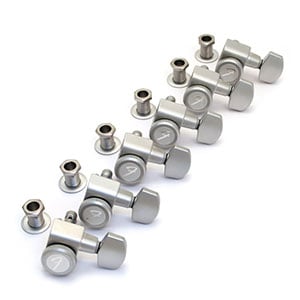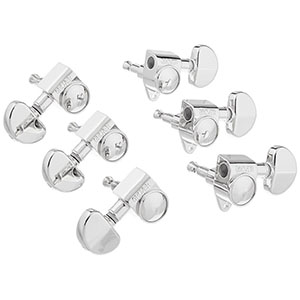- Home
- Instruments
- Gear
- Recording
- Lessons
- Reviews
- Blog

Locking tuners are one of the latest hot accessories to hit the mainstream. So much so that some guitar manufacturers ship their guitars with locking tuners installed. However, there is a lot of misinformation going on about this type of tuning machines. Today we are going to explain what locking tuners will and won't do, as well as show you some of the best locking tuners on the market. By the time we are done, you should have all the necessary information about tuners of this type. With that said, lets get started.
Guitars, much like all string instruments are prone to falling out of tune. This is especially true if you are aggressive in your playing style. Frequently bending strings, using tremolos and similar things will undoubtedly have a negative impact on your tuning. This is where most users turn to locking tuners. The idea is that locking tuners prevent such risks and offer rock solid key retention. Here's the thing. Locking tuners aren't immune to dropping out of tune. As a matter of fact, half of the time it's not your tuners that are at fault. The bridge, nut and other components can have an impact on your key as well.
With that said, locking tuners definitely reduce the risk of your guitar falling out of tune. The main difference between standard tuners and locking ones is the fact that you don't have to wind the string around the tuner numerous times. Instead, you just push it through the peg and lock it using the provided mechanism.Those couple of wraps are what can cause tuning issues. Since they are no longer required, your tuning stability is becomes much better.
When you go out looking for an aftermarket set of locking tuners, there are several things you need to look for. For starters, there is the size of the tuner itself. Some models are designed for specific guitars and will be a perfect fit, but some may require you to widen the hole in your headstock. If you can get a drop in set of tuners, you are golden. However, making those adjustments to your instrument shouldn't stop you either. It's a pretty normal thing. Then we have the orientation of the tuners. There are staggered sets for guitars where tuners are all on the same side of the headstock, but there are 3/3 sets. These are meant for headstock designs such as the one Les Paul features.
Lets get back to customizing your headstock for a moment. This can be a very scary process for those who aren't familiar with basic woodworking. Fact of the matter is that different brands use different gauge tuners. You simply won't find an aftermarket set that fits every single guitar out there. Because of this, drilling out your headstock to make room for a new set of tuners tends to be a very normal thing. You can easily learn how to do this with any of the numerous guides available online. However, if you are not comfortable handling this type of job, it is probably better to take the guitar down to a shop and have them do it. Since installing aftermarket tuners isa common process, you won't have to pay too much to get it done. Now that we know a bit about locking tuning machines, it's time to check out some cool models.
When it comes to Strats, or most Fenders for that matter, it is best to stick to inhouse tuners. Fender offers a variety of different sets, most of which are great at keeping the guitar in tune. The one we have picked for this short rundown is pretty basic but ultimately perfect for Strats.
| Image | Locking Tuners / Rating | Summary | Check Price |
|---|---|---|---|
+ -  | Fender Locking Tuners Total of 4.80/5 | The current golden standard for all Startocasters and Telecasters, designed by Fender. |

| Design: |  |
| Reliability: |  |
| Value: |  |
There are several reasons why Fender's tuners are the bee's knees for Strats and Telecasters. The most obvious one is compatibility. These will drop in flush, with no need to cut anything or drill holes.
You can swap them out fairly quickly, thus upgrading your guitar without much effort. Fender did an awesome job in terms of manufacturing, which makes their locking tuners almost bullet proof. They work and they work well.
Just keep in mind that Squier Strats aren't compatible with these due to a different style of tuners being used. Other than those, both US andMexican Fender guitars are fully compatible.
PRS offers a great middle ground between Fender and Gibson. This is most likely why they haveskyrocketed in popularity these past decade. If you are looking for aftermarket locking tuning machines for PRS SE, you have a couple of options. We are going to name a few of the most popular ones.
| Image | Locking Tuners / Rating | Summary | Check Price |
|---|---|---|---|
+ -  | Grover 406C Rotomatic Total of 4.80/5 | A very sturdy set from a great brand, which features auto locking. | |
+ -  | Gotoh MLG3-G Total of 4.73/5 | A more basic set that is all about core performance and reliability. |

| Design: |  |
| Reliability: |  |
| Value: |  |
Grover is one of the biggest names in the industry of guitar tuning machines. They have gained their reputation by producing what are easily some of the best tuners in the world, but also by innovation.
Grover 406C Rotomatics are awesome in a sense that they provide automatic locking. When you pull the string through and start tuning it, the first quarter or so of a turn will activate the locking mechanism. With a 18:1 gear ratio, these are among the most precise tuners on the market.
Best of all, they fit a PRS SE series pretty much perfectly. You can also use them on different guitars with 3 by 3 layout, although some may need adjustments in order to fit properly.

| Design: |  |
| Reliability: |  |
| Value: |  |
Along with Grover, Gotoh is another brand that offers solid solutions for a variety of guitar types. Their MLG3G is a great choice for PRS SE, although it fits numerous 3 by 3 headstocks on the market.
What defines this particular set is their rock solid build quality. Gotoh MLG3G also comes with the auto locking feature, meaning that you can swap strings fairly quickly.
In terms of precisions, you are looking at rather fine gearing and great feedback. If you are into higher gauge strings, you can get away with some pretty thick choices. In that sense, Gotoh MLG3G has your back.
Those who don't mind altering their headstocks a little to fit aftermarket tuners, can broaden their options quite a bit. In this segment we will show you some of the most popular choices which work.
| Image | Locking Tuners / Rating | Summary | Check Price |
|---|---|---|---|
+ -  | Grover 502C RotoGrip Total of 4.70/5 | Another Grover model which also features fine tuned gearing and rock solid build. | |
+ -  | Sperzel 6 InLine Locking Tuners Black Total of 4.70/5 |

| Design: |  |
| Reliability: |  |
| Value: |  |
Grover's 502C RotoGrip tuners are similar to the ones we have covered above, but are much more suitable for general purpose use. They come in chrome and feature rock solid build quality.
Where as 406C offers automatic locking, 502C requires manual locking using a thumb screw. These also offer the 18:1 gearing, which makes them pretty accurate while offering solid feedback.
In essence, it's not that much of an disadvantage even though it adds that little extra step. Kit includes all the necessary hardware, meaning that you just have to make sure that holes in the headstock are done right.

| Design: |  |
| Reliability: |  |
| Value: |  |
If Grover is the face of the coin, Sperzel is what you find on the other side. This particular set is one of their most popular offerings. It is a staggered pack of six tuners that can be installed on any number of guitars.
As always, you might need to drill wider holes depending on your particular guitar, but most often they fit with no issues. What defines Sperzel's gear is the amountof consistency and reliability it brings to the table. Tuning retention is superb to say the least.
These don't have an auto locking feature, but instead use the thumb wheel much like other brands. Overall, Sperzel's 6 InLine set is a great choice, especially at this price.
Aftermarket locking tuners are an inexpensive performance booster. However, sometimes they are actually necessary. Any guitar, no matter how much you paid for it, is only as good as its ability to retain a key. If it can't meet that rudimentary requirement, it won't be of much use. It is common knowledge that a simple set of locking tuning machines can turn a starter guitar from a practice axe to something that can easily be used on stage. Changing tuners is inexpensive, easy and simply logical in most cases.
Models we have shown you today are by far some of the best. With that said, there are many more awesome sets made by these brands and many other. If you are thinking about swapping tuners, the best way to start your search is to look for sets that require no drilling or other types of adjustments. Depending on the model of your guitar, this may be tricky. Either way, you can always drill some holes and be done with it.

Norm Salisbury says
What no Hipshot Grip=Lock tuners? I have just purchased a set of these which are still on the way to me in New Zealand.Would have been good to include an innovative brand of tuners liKe the Hipshots as they are a little different from the other styles out there.